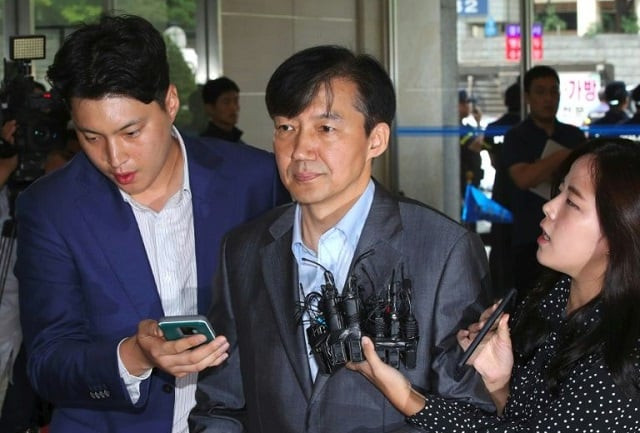Elitism scandal engulfs would-be justice minister in South Korea
Critics say the byline helped her unfairly gain admission to the prestigious Korea University the following year

South Korea's next justice minister is a liberal darling with an impeccable resume but now faces allegations of favouritism and hypocrisy. PHOTO: AFP.
A liberal darling with an impeccable resume, Cho is a prolific author once detained for his rights activism and has spent years championing progressive causes, boasting more than a million Twitter followers.
President Moon Jae-in -- himself a former human rights lawyer -- appointed him to a top government position in 2017 and this month named him justice minister, with a mission to reform the prosecutor's office.
Koreas verify removal of frontline bunkers
But officials from the agency Cho hopes to lead carried out simultaneous raids this week on 20 institutions in an investigation linked to his daughter's education and a private equity fund.
South Korea is an intensely competitive society where learning is seen as vital to social and professional prospects and elite high schools have often been criticised -- including by Cho, who has said they led to a "more unfair society".
So he was slammed for hypocrisy when it emerged he had sent his own daughter Cho Min to just such an institution and she had appeared to benefit from family connections.
After a two-week internship, she was named the lead author of a paper in the Korea Journal of Pathology entitled "eNOS Gene Polymorphisms in Perinatal Hypoxic-Ischemic Encephalopathy" -- an impressive achievement for a teenage schoolgirl, but an implausible one.
Critics say the byline helped her unfairly gain admission to the prestigious Korea University the following year, and she later received scholarships from a medical graduate school six consecutive times, despite failing her exams twice.
Relatives are also said to have invested 1.35 billion won ($1.1 million) in a private equity fund suspected of dubious operations, and investigators have banned several family members from leaving the country.
Cho -- previously seen as a possible contender to succeed Moon -- has admitted his words and actions were inconsistent but insisted he had done nothing unlawful.
"I have tried to be a 'reformist', but I humbly confess I was not stringent enough as a father," he told reporters.
The Korea Herald questioned the sincerity of his apology in an editorial. "Feeling betrayed by Moon's pledge to ensure opportunities are equal, processes fair and results righteous, many sneers at Cho and the Moon regime," it said.
Cho is set for a confirmation hearing in parliament next week, but the South Korean presidency has wide-ranging executive powers and the legislators' decision is not binding.
Score-settling is ingrained in the country's winner-take-all political system, with every one of the country's living former presidents either currently in prison or convicted of crimes after leaving the office.
Moon's mentor Roh Moo-hyun, whom he served as chief of staff in the 2000s, killed himself by jumping off a cliff after being questioned over corruption allegations involving family members.
Moon has wanted to reform the prosecution authorities ever since, believing them to be overly politicised -- a cause Cho has vehemently supported.
The scandal around him gave the public a "glimpse into how the privileged have various resources at their disposal to get their kids ahead in school", according to Jung Hyun-jin of the Korean Teachers and Education Workers Union.
"The Cho case is not just the problems of an individual, but of the whole system," she said.
North Korea's Kim to allow international inspections in bid to revive nuclear talks
It comes amid growing concerns over widening income divides in the world's 11th-largest economy, a theme seized on by South Korean director Bong Joon-ho, whose movie "Parasite" won this year's top prize, the Palme d'Or, at Cannes.
While the satire addresses the issue in "metaphorical terms", the Cho scandal was a real-life example, columnist Kim Min-ah wrote in the Kyunghyang Shinmun newspaper.
"Everyone had some sense of 'privileges for the elite' going on but few had actually witnessed it," she said.
Now, thanks to Cho, most people know how the system can be abused, she said. "He has opened Pandora's box."



















COMMENTS
Comments are moderated and generally will be posted if they are on-topic and not abusive.
For more information, please see our Comments FAQ